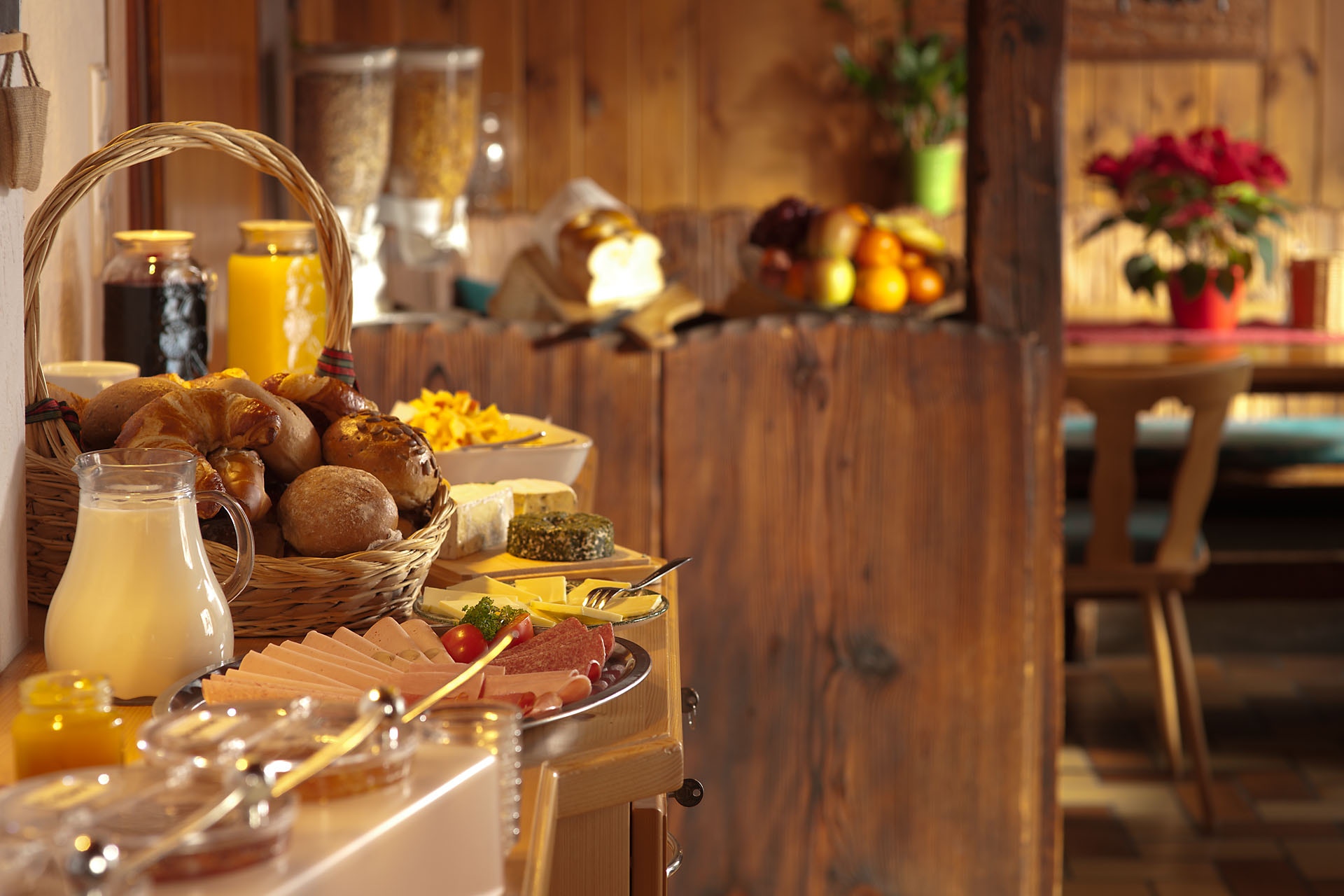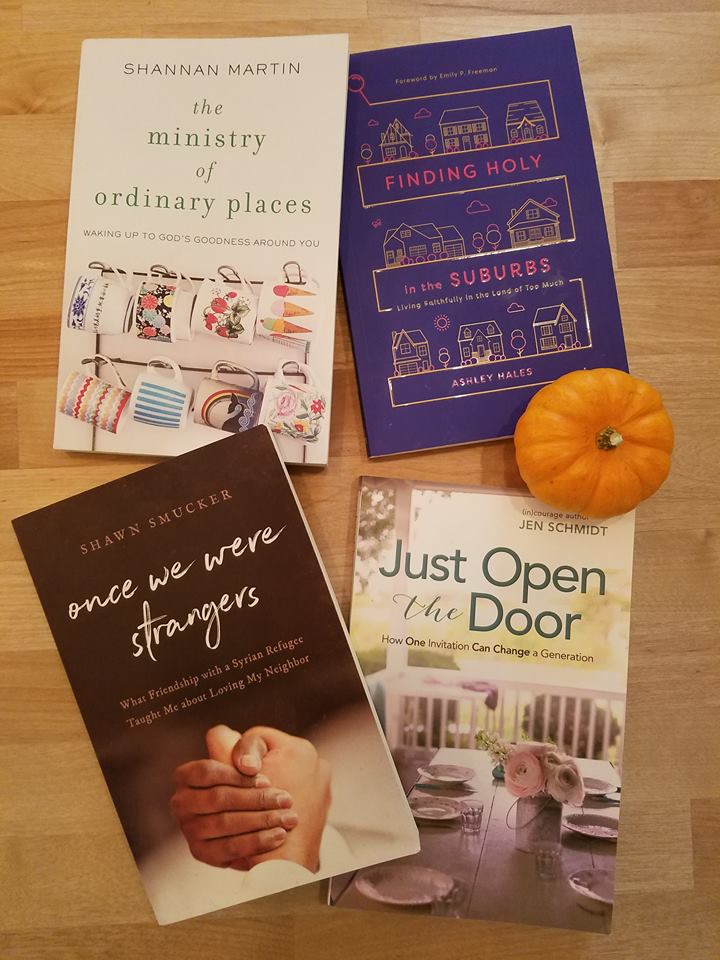This post kicks off our theme this month, “Practical (and Impractical) Hospitality.” Check back, comment, and/or follow along on social media to join the conversation! Plus, we’re giving away a free copy of Just Open the Door! Find more details at the bottom of this post.

By Ronne Rock | Twitter: @RonneRock
The kind Vicar smiled and asked who might like to host an evening of good food and great conversation, and sign-up sheets were placed on the table that serves as foyer and guest registry and whatever else is needed on any given Sunday. Church services in an elementary school cafeteria mean that communion is served each week amidst signs encouraging kids to be polite and clean up after themselves, and food pantry contributions are collected in the “nut-free zone” to the right of the front doors. There is no special lighting, no comfortable seat cushions for the lunch tables turned into pews—but there is a nice coffee bar for everyone who attends, set up by volunteers who are quick to offer a napkin and a smile, served up with a piece of homemade pumpkin bread.
Church in an elementary school means that anything that happens beyond Sunday mornings happens somewhere else. Most of the time, that somewhere else is in someone’s home.
Folks who know me would see it is as no surprise when I raised my hand without hesitation to host a dinner. The kitchen and the table are sacred places to me—so much so that I even have a section on my website devoted to #kitchentherapy. There are always lessons to be learned, there is always grace to be lavished and hope to shine brightly there.
Some folks say I have the spiritual gift of hospitality.
I beg to differ.
Because I don’t believe hospitality is a gift.
Oh, I think there are most certainly gifts that are divinely inspired – mine are exhortation, leadership, and wisdom (though I question the last one quite often when I can’t find my glasses while they’re sitting on my face or I freak out that my phone has gone missing while I’m talking to someone on it). But I believe hospitality isn’t one of those gifts for any of us. Rather, it’s a discipline to be practiced by each and every one of us. It’s sprinkled all throughout scripture – in Romans 12, we are told to be kind to everyone and extend hospitality to strangers, and in Hebrews 13, it says that our hospitality may even be brightening the day of angels. Hospitality goes far beyond hanging out with friends. It means caring for strangers, refugees, widows, orphans, wayfaring travelers in need of a little kindness.
It even means treating our enemies with kindness. Yes, even our enemies.
Hospitality isn’t something only some of us are divinely equipped to do. No, hospitality is at its essence a reflection of the personality of Jesus. Maybe that’s why 1 Peter 4:8-9 likens being hospitable with loving well – and we are encouraged to extend hospitality without complaining about it.
Jesus certainly didn’t have to be hospitable to the man He knew was plotting to end His life. And yet, He invited Judas to the same Passover meal as He did the rest of the disciples. He offered Judas the same bread, poured Judas the same wine, and even knelt to wash his feet.
Jesus didn’t have to be hospitable to the disciple who denied even knowing Him as He hung on a cross. And yet, He cooked a fabulous fish and biscuit breakfast for Peter and then told him that love was going to flow through his life like a river.
Hospitality is a potluck. It is a safe place to sleep, or some clean clothes to wear. Hospitality is a kind word or a genuine smile on a hard day, a little spare change to make the journey easier, a warrior prayer. Hospitality is at its best when it’s shared without discrimination, and it shows its muscles most when it is lavished on souls who don’t expect it.
Trust me, I’m still working on the whole hospitality thing. Laying down my life as a welcome mat for others grinds away the sharp barbs of control and smooths the rough edges of privilege and entitlement. Even the simple act of saying “yes” to a potluck is a lesson in the making, because it means I can’t force the outcome. And for a girl who stares down perfection and anxiety on a regular basis, simply trusting God to indeed work all things together for good (including a dinner filled with folks I don’t know and food I might not like) is a much-needed thing. Here’s to practicing hospitality over and over again.
About Ronne:
 Ronne Rock weaves themes of transformative hope into everything she shares on page and stage. An award-winning marketing and communications executive in both the corporate and nonprofit sectors, she offers expertise about creative leadership with faith-based organizations. Ronne is a regular contributor to Orange and QARA, a digital publication that empowers 20-somethings to discover their True North. She now invests her time telling stories that change stories with Orphan Outreach, a ministry dedicated to serving orphans and vulnerable children in developing countries around the world. Ronne also loves to share personal stories about life, love, leadership, and a little #kitchentherapy. Her words are published in Everbloom: Stories of Deeply Rooted and Transformed Lives and the For You Love devotional series. When she’s not working in developing countries, you’ll find Ronne in the Texas Hill Country with her husband, Brad, and rescue mutt, Pearl. Their son and his family live in Arizona, which she has deemed is too far away. You can follow her on Facebook, Instagram, Twitter or at her website.
Ronne Rock weaves themes of transformative hope into everything she shares on page and stage. An award-winning marketing and communications executive in both the corporate and nonprofit sectors, she offers expertise about creative leadership with faith-based organizations. Ronne is a regular contributor to Orange and QARA, a digital publication that empowers 20-somethings to discover their True North. She now invests her time telling stories that change stories with Orphan Outreach, a ministry dedicated to serving orphans and vulnerable children in developing countries around the world. Ronne also loves to share personal stories about life, love, leadership, and a little #kitchentherapy. Her words are published in Everbloom: Stories of Deeply Rooted and Transformed Lives and the For You Love devotional series. When she’s not working in developing countries, you’ll find Ronne in the Texas Hill Country with her husband, Brad, and rescue mutt, Pearl. Their son and his family live in Arizona, which she has deemed is too far away. You can follow her on Facebook, Instagram, Twitter or at her website.
***
 This month on Scraping Raisins we’re talking about practical and impractical hospitality. Be sure to follow along on my social media channels (buttons on top right of website) and subscribe to my newsletter to be updated on all the posts, plus links to thought-provoking articles from the web and a few books and podcasts.
This month on Scraping Raisins we’re talking about practical and impractical hospitality. Be sure to follow along on my social media channels (buttons on top right of website) and subscribe to my newsletter to be updated on all the posts, plus links to thought-provoking articles from the web and a few books and podcasts.
I still have a few spots open this month, so email me at scrapingraisins (dot) gmail (dot) com if you’re interested in guest posting! You can find writing guidelines here. I would need your submission by October 15th;-)
***
 In honor of this month’s theme, I’ll be giving away a copy of Just Open the Door: How One Invitation Can Change a Generation, by Jen Schmidt, to one Scraping Raisins reader! This book shares how to take the next steps in extending hospitality to others. To win:
In honor of this month’s theme, I’ll be giving away a copy of Just Open the Door: How One Invitation Can Change a Generation, by Jen Schmidt, to one Scraping Raisins reader! This book shares how to take the next steps in extending hospitality to others. To win:
1. Be sure you’re subscribed to my newsletter
2. Share this post on one of your social media outlets (Twitter, Facebook or Instagram) and tag me (find me as either “Leslie Verner” or “Scraping Raisins”).
3. If you tag friends in your share, I’ll enter you once more for each friend you tag.
I’ll be keeping track on my trusty post-it note by my computer and I’ll notify the winner on October 31st! 😉
Sign up for the (occasional) Mid-month Digest and the (loosely) “end of the month” Secret Newsletter for Scraping Raisins Here:
*this post includes Amazon affiliate links



 Josi grew up on a farm in rural Nebraska. She received a Masters in Biblical and Intercultural Studies in Chicago. Shortly thereafter, Josi and her husband moved to West Africa to do business and non-profit work. Once they returned to Chicago, they worked for a refugee resettlement agency. Now they work for
Josi grew up on a farm in rural Nebraska. She received a Masters in Biblical and Intercultural Studies in Chicago. Shortly thereafter, Josi and her husband moved to West Africa to do business and non-profit work. Once they returned to Chicago, they worked for a refugee resettlement agency. Now they work for 
 This month on Scraping Raisins we’re talking about practical and impractical hospitality. Be sure to follow along on my social media channels (buttons on top right of website) and
This month on Scraping Raisins we’re talking about practical and impractical hospitality. Be sure to follow along on my social media channels (buttons on top right of website) and 
 Ronne Rock weaves themes of transformative hope into everything she shares on page and stage. An award-winning marketing and communications executive in both the corporate and nonprofit sectors, she offers expertise about creative leadership with faith-based organizations. Ronne is a regular contributor to Orange and QARA, a digital publication that empowers 20-somethings to discover their True North. She now invests her time telling stories that change stories with Orphan Outreach, a ministry dedicated to serving orphans and vulnerable children in developing countries around the world. Ronne also loves to share personal stories about life, love, leadership, and a little #kitchentherapy. Her words are published in
Ronne Rock weaves themes of transformative hope into everything she shares on page and stage. An award-winning marketing and communications executive in both the corporate and nonprofit sectors, she offers expertise about creative leadership with faith-based organizations. Ronne is a regular contributor to Orange and QARA, a digital publication that empowers 20-somethings to discover their True North. She now invests her time telling stories that change stories with Orphan Outreach, a ministry dedicated to serving orphans and vulnerable children in developing countries around the world. Ronne also loves to share personal stories about life, love, leadership, and a little #kitchentherapy. Her words are published in  In honor of this month’s theme, I’ll be giving away a copy of
In honor of this month’s theme, I’ll be giving away a copy of 